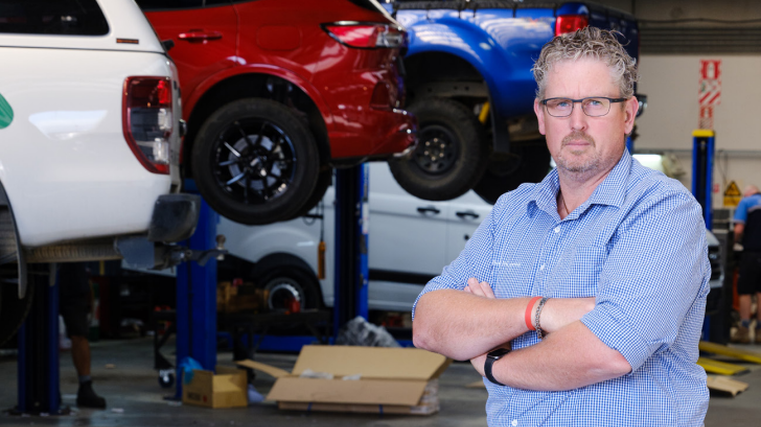WOF regime needs overhaul

Vehicles more than 15 years old should be required to undergo six-monthly warrant of fitness (WOF) inspections, says the Motor Trade Association (MTA).
The organisation is also calling for a review into the testing regime to ensure WOFs are fit for purpose and for in-service emissions to be assessed.
The MTA describes the requirement that only vehicles registered before 2000 require a six-month warrant as “dangerously outdated” because older vehicles lack modern technology that keeps passengers safe, and they deteriorate through age and use.
“Vehicles that are 22 years old are undergoing the essential safety check only once a year,” it adds. “This increases the window and likelihood of unsafe vehicles on our roads. More than 50 per cent of vehicles over 15 years old fail their warrant at the first inspection.
“As a matter of priority, the regime must be reviewed and updated. We apply the same test to a vehicle that is five years old as we do to one that is 25. More New Zealanders will die on our roads if the WOF is not changed.”
In addition, the MTA is lobbying the government to ensure all cars on our roads have a current WOF and for it to enable the Ministry of Social Development to financially support low-income families to obtain one.
“All New Zealanders have the right to travel safely on our roads,” the association stresses in its call to action to the next government, which was unveiled at parliament on May 9. “No family should ever lose a loved one in a crash.
“Ensuring vehicles on our roads are safe, reliable and maintained is an important component in making sure we all get home in one piece. Safety also means reducing harmful emissions that contribute to the deaths of thousands of New Zealanders every year and threaten the health of future generations.”
In a bid to tackle emissions, the MTA wants vehicles to automatically fail their WOFs if their engine-warning lights are on when inspected.
As a first option, it’s calling for mandatory emissions testing for all vehicles more than 10 years old to ensure they travel further on their fuel supply, which would effectively reduce emissions.
In addition, increasing awareness and education around emissions testing will enable policy for their reduction to be informed, and ensure motorists are better educated about emissions profiles and environmental impacts.
The MTA stresses that pollution produced by many inefficient, older vehicles has been linked to the deaths of thousands of Kiwis.
“Last year, the Health and Air Pollution in NZ study concluded 3,300 people are dying prematurely every year because of air pollution, mostly the nitrogen dioxide produced by cars. In addition, harmful emissions damage the environment and contribute to climate change.
“Harmful emissions also hurt New Zealanders financially – poorly serviced vehicles cost more in fuel to run and be more likely to need expensive repairs.
“A well-serviced vehicle will travel further on the same amount of fuel than a poorly serviced one. A warning light commonly indicates a poorly maintained engine that’s likely to be causing harmful emissions. This should be addressed in the WOF check.
“Zero-emission vehicles on our roads are only part of the solution. With the vast majority of our aging fleet running on fossil fuels, emissions testing is vital for the health of everyone.
“Many countries in the OECD conduct rigorous testing. We must follow suit. Emissions testing and regular servicing, especially of older vehicles, will make a significant difference to reducing emissions that harm communities.”
What industry says
“The current emissions testing rules in the WOF are a joke,” says Matt Greene, service manager at Dunedin City Motors, which holds franchises for Ford and Mazda. “The whole WOF regime needs to be looked at.
“When it comes to second-hand vehicles, New Zealand has a history of taking other countries’ rubbish. We’ve got cars that are 22 years old on our roads that only need a warrant every 12 months. That makes no sense.”
Greene, pictured above, adds that it’s important to not peg the warrant to a date, but make it a sliding scale. “Every vehicle over 15 should be made to get a warrant every six months. It’s only another $70 a year to the consumer, but the price of not doing it is much higher.
“The new government needs to put a greater emphasis on vehicle safety. Reviewing warrants is something they could do in a short space of time. We need to remove some of the ambiguities in the warrant – there’s too much interpretation in there.
“Unsafe tyres are one thing that’s a major issue. You see old cars on bald tyres, bouncing around on dodgy suspensions. It’s an accident waiting to happen.”
When it comes to emissions testing, Glenn Thorley, owner and director of Grimmer Motors, an automotive repair and servicer in Hamilton, describes the current WOF rules as a “joke”.
“Basically, you’re just meant to rev the engine and look at how much smoke comes out,” he says. “If you did that, you’ve already polluted the environment. You don’t even fail your warrant if your engine-warning light is on. That should be an automatic fail, the same as if the airbag or ABS light is on.
“Thousands of people are dying every year from air pollution. Imagine if thousands were dying every year because of airbag or ABS failures – the government would be all over it.
“Servicing the vehicle makes a huge difference, especially to older cars. The number-one cause of high emissions is a misfiring engine, pumping raw fuel into the air basically. If you don’t service your car, you get misfires.
“The government needs to lead in this space. Look at the realities of our fleet. A campaign to encourage people to get their vehicles tested would be useful.
“It’s understandable people put off getting a service because money’s tight at the moment. But if you don’t do preventive maintenance, it’ll cost – cost lives, cost the environment and cost you money.”
Safety on our roads
Vehicle safety must be prioritised with driver behaviour and road improvements, insists the MTA.
It broadly supports the Road to Zero vision where no one is killed or seriously injured on our roads.
“There are simply too many unsafe vehicles on our roads. Forty per cent of vehicles now fail their warrant at first inspection and, in some regions, the failure rate is as high as 46 per cent. Seventy per cent of these failures are due to non-compliant lights, tyres, brakes, suspension and steering – all critical safety features.
“Data from the Ministry of Transport shows that between 2015 and 2019 around 10 per cent of fatal crashes involved a vehicle factor. That was up from around five per cent in the previous few years.”
The MTA adds every community must have enough qualified WOF inspectors to ensure vehicles are being checked thoroughly and promptly.
“Most importantly, there must be enough skilled workers to carry out important safety repairs detected during a WOF. If workshops are short-staffed, unsafe vehicles are more likely to be on our roads as owners delay or defer important maintenance.”





